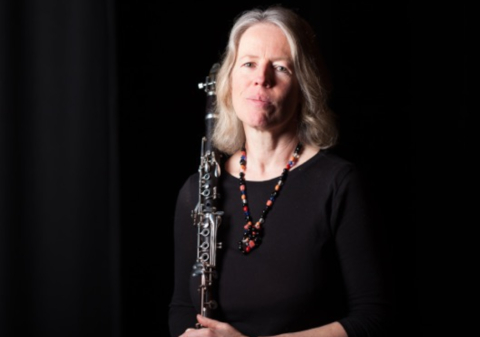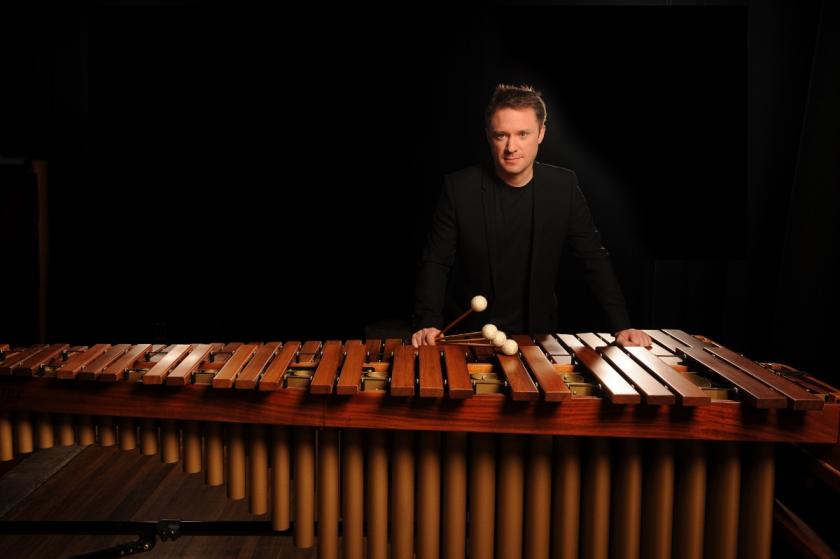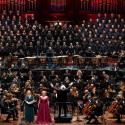Finding one piece for marimba soloist and string orchestra would tax the powers of many concert planners, never mind coming up with two, so the Northern Chamber Orchestra is to be congratulated on its first Manchester performance of 2020 – especially since they found two concerto-style works from almost the same point in recent time: 2009 and 2010. Qualify that by adding that one has a second soloist, a clarinet, but impressive nonetheless.
Colin Currie was the star marimba soloist for both Stephen Barlow’s Nocturne for clarinet, marimba and strings and Kurt Schwertsik’s marimba concerto titled Now You Hear Me, Now You Don’t; Elizabeth Jordan his collaborator in the former. The NCO fielded a big string body for this event: in the Stoller Hall at Chetham’s School of Music, they sounded pretty magnificent under the first-desk leadership of Nicholas Ward, though the opening Praeludium from Grieg’s Holberg Suite was really just a warm-up. Still, it had plenty of spirit and feeling.
Then came the first big piece: Barlow’s Nocturne, which the composer conducted. He and the NCO have a long-established relationship from his days as artistic director of the Buxton Festival, during which he worked with them in the opera pit many times, and mutual esteem is evident. His piece was written for Emma Johnson, and the clarinet solo takes the lead much of the time, but it came out as a genuine double act on this occasion.
 Elizabeth Jordan (pictured right) is the NCO’s own principal clarinet: she brought, through a vast range of dynamic and tone, the mystery and imagination the music is all about. Barlow calls it “a short story”, rather than an attempt to emulate one of Chopin’s static visions, and explicitly aims to capture darkness, sleep, imagination and adventure. Formally a freewheeling fantasia, it has a clear narrative shape, beginning and ending in quietness while building tension to quite scary heights in between. The harmonic language is rich, stimulating without being alarming, and finally evocatively sweet – both soloists playing with subtlety and eloquence.
Elizabeth Jordan (pictured right) is the NCO’s own principal clarinet: she brought, through a vast range of dynamic and tone, the mystery and imagination the music is all about. Barlow calls it “a short story”, rather than an attempt to emulate one of Chopin’s static visions, and explicitly aims to capture darkness, sleep, imagination and adventure. Formally a freewheeling fantasia, it has a clear narrative shape, beginning and ending in quietness while building tension to quite scary heights in between. The harmonic language is rich, stimulating without being alarming, and finally evocatively sweet – both soloists playing with subtlety and eloquence.
Schwertsik’s post-modern music has a reputation for being quirky, if not downright satirical. This marimba concerto was written for Colin Currie to play with the Scottish Ensemble originally, and has five movements, most of them evoking the spirit, if not the letter, of musical styles gone by. The opening, for instance, is a no-frills baroque-classical overture, but with slightly off-piste harmonies; later you wonder whether you’re hearing something modal and folk-ish, and finally there are energetic rhythmic games of a kind Shostakovich might have played. But the second movement is the one that seems most serious (though taxing for the soloist), as the harmonic palette widens and the music gathers emotional power without frippery. Maybe that’s the point of the Now You Hear Me, Now You Don’t title (the stress being on “Me”), as if the other movements are intentionally a bit derivative, but this one is Schwertsik’s own voice.
Colin Currie was not just virtuoso performer but thoughtful interpreter in every nuance of this music, and he liked the second movement so much he suggested they play it again as an encore.
The second part of the concert was on more predictable string orchestra territory: Two Aquarelles by Delius – actually orchestrations by Eric Fenby of early choral works – and Dvořák’s Serenade for Strings. Nicholas Ward led the NCO in a very fine reading of the former, balancing the voices skilfully (never mind that it’s the sort of slithery chorded music that Vaughan Williams described as "like the curate improvising"), and the Dvořák came over – as it rarely fails to do – as poised, resonantly tender, gracefully energetic, gently expressive and finally a busy work-out for a team of hard-working players. It was at its best in its more tender moments, which are many, and occasionally a little scrambled in its frantic ones, but eloquently precise in the rhythmic detail of the Larghetto, and always superbly judged in phrasing and persuasive in its power to communicate.














Add comment